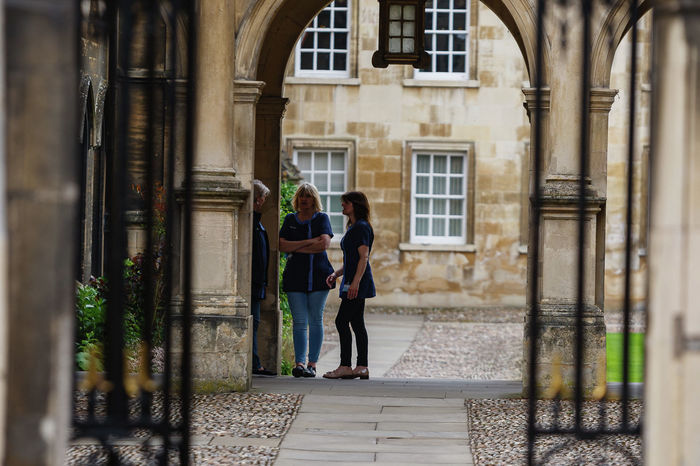University can be a halfway house for young people
Pastoral support at university could become more than an added bonus, if given the proper government support

I don’t know about you, but my family always jokingly bemoans the fact that universities – and Cambridge more than most – are so divorced from the “real world”. Adult life doesn’t come with cleaners and catering and the occasional petting zoo. Most of the time, you have to fend for yourself.
I no longer understand why this interim before adulthood can’t be celebrated instead of derided. There is a chance for another learning opportunity here, alongside our chosen subject. Beyond the skills needed to live by ourselves, there is more serious learning at stake.
The NHS found in 2023 that one in five people between the ages of eight and twenty-five had a mental health problem, increasing significantly from 2017 and since the pandemic in 2020. Suicide is the leading cause of death among five to thirty-four-year-old men and women. Our mental health is only getting worse, at a time when it seems like the resources that could help are only shrinking.
This is where universities can come in. Thousands of young adults spend three to four years living and studying in institutions that became pastoral as well as academic a long time ago. The structures are already in place for this care to become increased and hyper-normalised. If we are given the right tools, we will be able to help ourselves cope away from home and after university, and change the statistics on youth mental health.
"we will be able to help ourselves cope away from home and after university"
This is especially relevant for students, between mandatory education and full-time employment, as well as after recent student deaths across the country as well as in Cambridge. Bereaved parents of students who died by suicide are campaigning with the Learn Network for universities to have a legal duty of care for their students, like schools and employers. With the right incentives and funding from the government, universities can be in a position to help their students and minimise the effects of stress, in accordance with a formalised, legal responsibility.
I want to imagine a model of the “uni experience” where the government works with universities to lift students out of the legal no man’s land which a lack of duty of care leaves them in, without an institution to formally take up this responsibility. This would use all kinds of support from finance workshops to cooking classes to free therapy and diagnoses; pastoral care would be interconnected in order to normalise accessing mental health support. Our time at uni can become a kind of halfway house before the dreaded “real world”, where we can be as prepared as possible for the stressful things to come.
"Our time at uni can become a kind of halfway house before the dreaded “real world”"
“And where will the money come from?” says Rachel Reeves, pointing a finger at the future bill for all this spending. Labour’s ‘iron-clad fiscal rules’ don’t leave much room for daydreaming about the future, particularly at a time when the higher education system is reaching breaking point. But, like all funding for youth clubs or preventative health screenings or adult education, it is less about spending and more about investment. (Perhaps if we pitch mental health support like this, they’ll add to their big business policy.)
The point is that providing people of typical student age with the tools with which to help themselves as adults will only lighten the load on the state later on. They’ll practically be pulling themselves up by their bootstraps! Conservatives will love it.
I am eternally grateful that when I needed access to counselling, the university could provide it, without fuss and no longer with a limit on the number of sessions. Not only should this be standardised across other universities, with enough funding to make up for a non-Oxbridge budget, but it should become a colloquial part of our undergraduate life. Built-in pastoral and mental health support could be a culturally-accepted and culturally-expected part of uni, before it becomes impossible to access without a hefty price tag.
Universities can’t ensure that every student gets access to counselling once they have graduated. They can still play a huge part in equipping their graduates with the knowledge of how to look after their mental wellbeing throughout their lives, whether they develop a diagnosable mental health problem or not. We can learn to look after ourselves as students and “real life” adults, and be more prepared if we need extra help, without the stigma or the financial burden.
 News / Uni Scout and Guide Club affirms trans inclusion 12 December 2025
News / Uni Scout and Guide Club affirms trans inclusion 12 December 2025 News / Pembroke to convert listed office building into accom9 December 2025
News / Pembroke to convert listed office building into accom9 December 2025 Features / Searching for community in queer Cambridge10 December 2025
Features / Searching for community in queer Cambridge10 December 2025 News / Uni redundancy consultation ‘falls short of legal duties’, unions say6 December 2025
News / Uni redundancy consultation ‘falls short of legal duties’, unions say6 December 2025 News / Gov declares £31m bus investment for Cambridge8 December 2025
News / Gov declares £31m bus investment for Cambridge8 December 2025









